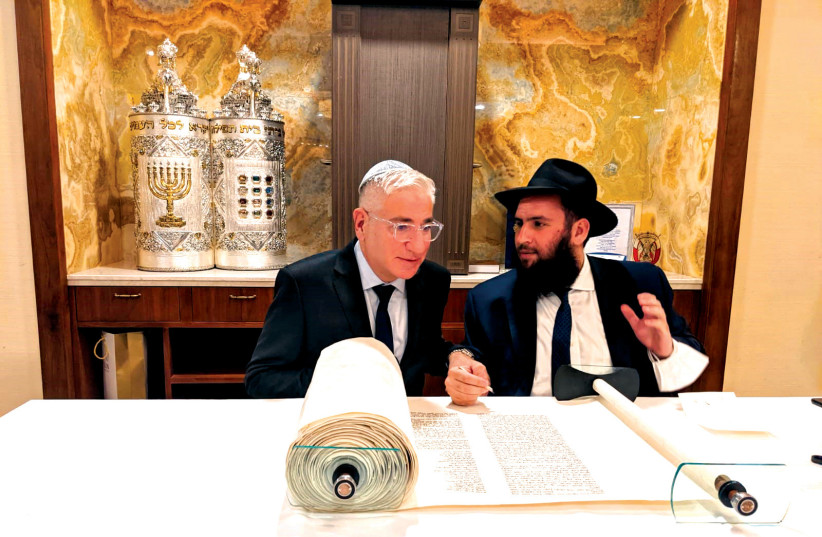There have been several elections in the two decades plus since 1999 when Ehud Barak entered his short-lived term as prime minister, after promising that the elderly woman at the end of the hospital corridor would, under his administration, have a bed in a ward. Guess what? The identity of the elderly woman has changed in the interim, but not the situation. There are still patients kept in hospital corridors, and there is still an acute shortage of doctors and nurses, as became patently obvious during the corona crisis.
More hospitals are needed in the North and South of the country – not only more hospitals but also more facilities. It is a nightmare for people living in peripheral areas to get to Tel Aviv or Jerusalem for an MRI, a kidney transplant, a mammogram or treatment for almost any life-threatening ailment.
For years, people in these areas were promised that medical equipment in their respective health clinics would be upgraded, that new hospitals would be built and that express trains would run all the way from Metulla to Eilat. Promises, promises – and very little to show for them.
Even in central areas, such as Tel Aviv and Jerusalem, where there is a greater concentration of medical services, try ordering a mammogram for next month or even six months down the road. Mission impossible. The Israel Cancer Association keeps hammering the importance of early diagnosis, but what’s the point if women have to wait months – in some cases almost a year – to get tested?
Is it any wonder that Ra’am MK Mazen Ghanaim, a former mayor of Sakhnin, rebelled against the coalition and voted with the opposition for the establishment of a hospital in his city? Ghanaim claims that he voted in accordance with his conscience because no public hospital has been built in an Arab city or town in Israel’s 73 years of statehood. Members of his party who are angry with him say that he voted as he did because he intends to again stand for mayor in the next elections. Even if that is true, there is little doubt that a hospital is needed in his region.

Sakhnin Mayor Dr. Safuat Abu Riya, in a radio interview with Keren Neubach on KAN Reshet Bet, said that Ghanaim was correct in voting as he did, because Sakhnin, which is central to all the Arab towns in the North, is desperately in need of a hospital. Existing hospitals, he said, are more than an hour’s drive away from any Arab community.
Ghanaim is the second coalition legislator to rebel, after Yamina’s Amichai Chikli, who is guided more by his ideology and his conscience than by coalition agreements. That puts the coalition government on shaky ground, also taking into account that Defense Minister Benny Gantz is not exactly happy about the status quo, and makes little effort to hide his disgruntlement.
Some political pundits say that it will not be the coalition renegades who bring down the government. It will be the steep rise in prices which will put a severe curb on spending. What is desperately needed in any future government of Israel is a minister whose task it will be to see that Knesset resolutions are implemented and government promises kept.

When the old Jerusalem Railway Station ceased operating as such in 1998, a series of ministers promised that there would soon be an express train from Jerusalem to Tel Aviv. It took almost 20 years for that promise to be realized with the inauguration of the Yitzhak Navon Railway Station opposite the Jerusalem Central Bus Station.
As for hospitals, the government has promised to allocate NIS 40 million toward the construction of a hospital in the Negev. It costs more than that to build a hotel. The needs of a hospital are much more complex. It will be interesting to see how long it will take for the new hospital to open its doors.
■ THE POLISH government which goes to great pains to deny that there was any collusion between Polish citizens and the Nazis, would do well to crack down harder than a mere three arrests on people such as ultra-right-wing activist Wojciech Olszanski and his followers who, on Polish Independence Day last week – just two days after the anniversary of Kristallnacht – symbolically burned the ancient Statute of Kalisz in which King Boleslaw the Pious accorded rights to Poland’s Jewish population. The book burning in the presence of a nationalist crowd elicited cries of “Death to the Jews.”
The government would benefit from taking note of the words of the great German poet Heinrich Heine, who was of Jewish background but converted to Christianity, and who as far back as 1821 – exactly two centuries ago – wrote: “Where they burn books, they will also ultimately burn people.”
If racists such as Olszanski are permitted to have influence in Poland without being prosecuted for inciting hatred, there will be no room for denials the next time around. If, heaven forbid, German history begins to imitate itself in Poland, the Jews now have an army to come to their rescue. It’s called the Israel Defense Forces.

■ AS A member of Knesset, Stav Shaffir was consistently vocal in defending the rights of people with physical and/or mental disabilities. Few people knew why she was so emotional about the subject. But now she’s making the reason very public. Her sister Shir is autistic and was born with developmental disabilities. For all that, she is very musical, plays the piano and sings. She is also a talented athlete and has won trophies. Not only that, but she insisted that she wanted to serve in the army, and did so in the special unit reserved for volunteers with disabilities.
The two sisters are very close. In fact, the whole Shaffir family is very close, and Shir is surrounded by love. But her parents and siblings worry about what will happen to her when they are not around to care for her.
The solution: the Ruppin Academic College, where Shir can develop to the best of her abilities and can be with people in her own age group who are also being trained to develop whatever potential each of them has, and that includes going into the mainstream workforce, and learning to be as independent as possible.
There is one snag. The Ruppin Academic College is still a day center, and its students all go home at night. Their families are appreciative of what they are taught, but would prefer for them to acquire greater independence, something that would be possible only if RAC is transformed into a live-in educational facility.

Stav Shaffir has made a video about life with Shir. The video includes scenes at home and at RAC, as well as the comments of parents of young men and women who are students at RAC. What they are all campaigning for is a fundraising drive to enable RAC to become a residential academic institution that will help people like Shir to find their own way in life and achieve maximum independence.
■ IN RECENT interviews that veteran United Torah Judaism MK Israel Eichler has given to religious media outlets, he has repeatedly said that Benjamin Netanyahu, after failing several times to win the elections, should have realized that it’s time to step down.
Eichler also said in some interviews that the religious parties no longer hold the election balance. Their place has been taken by the Arab parties. He has nothing against the Arabs, he said, because they were here before the arrival of the Zionists, and are entitled to all the rights accorded to Jewish citizens.
■ DEPUTY FOREIGN Minister Idan Roll knows a thing or two about using famous people to promote products and projects. He’s a former male model, and he’s married to pop singer Harel Skaat. Roll’s boss, Foreign Minister Yair Lapid, as a former television personality, is also aware, from personal experience, of the power of promotion by the famous.
Thus, when Roll suggested to him the establishment of an annual award to recognize champion athletes, internationally known chefs and people in the entertainment industry who have made significant contributions toward boosting Israel’s image abroad, Lapid enthusiastically embraced the idea.
The first awards will be made during Hanukkah to Eurovision winner Neta Barzilai, who is not only an impressive singer but also an eloquent and highly intelligent public speaker; prizewinning actress Shira Haas, who has helped to promote not only Israel’s image but also a greater understanding of religious Jewish life; Hollywood-based actress, writer, producer and pro-Israel activist Noa Tishby; NBA basketball player Deni Avadija; international soccer player Eran Zahavi; celebrity chef Assaf Granit, whose is well known in England and France; Fauda creators Lior Raz and Avi Issacharoff; actor Tomer Capon; chef Barak Yehezkeli, who goes around the world interviewing émigré Israeli chefs on television; Maccabi Tel Aviv Premier League and Euroleague American-Turkish basketball player Scottie Wilbekin, who, during Operation Guardian of the Walls, placed an Israeli flag on his balcony and screened newscasts of rockets directed at Israel; public diplomacy activist Yosef Hadad; and Dr. Dorit Nitzan Klusky, the highest-ranking Israeli in the World Health Organization. Given that the award is to be conferred by Lapid during Hanukkah, it will be appropriately known as Israel’s Light Unto the World.
■ LIFE CAN take one on many journeys. The idea is to go along for the ride!” said New York-born and raised author, journalist, interior designer, digital publisher, public speaker and bed-and-breakfast proprietor Anne Kleinberg.
Prior to moving to Israel in 1992, Kleinberg ran her own interior design company for 17 years, and also wrote for trade publications.
Blessed with a strong entrepreneurial streak, coupled with the curiosity and courage to plunge into new ventures, she many moons ago wrote a restaurant review for The Jerusalem Post, which led to her writing a regular culinary column in Metro, the paper’s now-defunct Tel Aviv supplement. Then came a series of cookbooks, followed by a novel.
At around the same period as she wrote her novel, Kleinberg in 2012 turned part of her large, beautiful home in Caesarea into a luxury bed-and-breakfast paradise, then went a step further and founded Cala Caesarea, whereby she makes the whole of the second floor available to a bride and her entourage to be pampered on the day of, or the day before, the wedding.
Now, as a successful writer and digital publisher, Kleinberg has a new project, which she is launching on Friday morning, November 26. Titled Anne Kleinberg’s Guide to the Universe, it comprises a series of panel discussions on various subjects by people who’ve been there, done that and succeeded, and can therefore give useful tips to others who may be heading in that direction.
The first discussion in the series is about the secrets of publishing. Kleinberg will be joined by author and editor Carol Novis and literary agent Lisa Ekus. The discussion, which starts at 10 a.m., will include a Q and A session, and will be followed by a scrumptious lunch. Full details are available at annekleinberg.com
■ WHEN HE took up his post as Israel’s first ambassador to the UAE, Amir Hayek probably realized that there would be several firsts related to his posting, but he may not have realized what an emotional experience it would be for him to attend the first Torah scroll inauguration in Abu Dhabi.
Donated by businessman and philanthropist Paul Packer and his wife, Yali, the scroll made its way to Abu Dhabi from the United States. The festive inauguration ceremony, led by Rabbi Levi Duchman, took place in the Beit Tefilah Synagogue, which the rabbi founded.
“I am very excited, to be the first ambassador here and to see the first Torah scroll in the great synagogue that you’ve established here,” Hayek told Duchman. “It is a very symbolic moment, of the warm welcome we have received here from our Emirati friends.”
■ NEFESH B’NEFESH co-founder Tony Gelbart can finally declare: “Don’t do as I say. Do as I do.” After 20 years of persuading Canadian, American and British Jews that Israel is their true home, Gelbart received his own immigrant ID card this week from fellow co-founder Rabbi Yehoshua Fass.
The occasion, witnessed by hundreds of well-wishers, including a JNF of America delegation that specially flew to Israel for the event, was the dedication this week of the impressive new, permanent Nefesh B’Nefesh Aliyah Campus in Jerusalem.
Among others who attended were President Isaac Herzog and two chief rabbis sitting side by side. One was Ashkenazi Chief Rabbi David Lau, but the other was not Sephardi Chief Rabbi Yitzhak Yosef. It was chief rabbi emeritus Rabbi Yisrael Meir Lau, who is David Lau’s father.
Gelbart said that 20 years ago, when he and Fass started their ambitious venture to bring more immigrants to Israel, people told him he was crazy, but someone told him he needed “Pesah.” Nonplussed, Gelbart queried what Pesah had to do with their project, and was told that it stood for Protekzia, Sovlanut (patience) and chutzpah. That formula has helped Gelbart, Fass and their partners to bring more than 70,000 immigrants to Israel – and still counting.
greerfc@gmail.com
